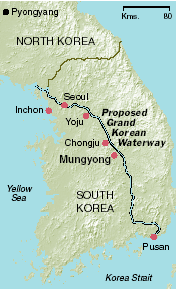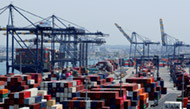Controversial Canal Tests South Korea’s New Leader.

The proposed Grand Korean waterway has been criticized for its environmental impact.
By CHOE SANG-HUN.MUNGYONG, South Korea - Like the weed-infested, rusting railroad tracks that run through here, this once prosperous mining town was left behind in South Korea’s economic growth - until President Lee Myung-bak began pitching the country’s most ambitious, and controversial, construction If Mr.
Lee’s plan goes through, the craggy mountains where miners once dug for coal will offer a new source of income: tourists and freight barges sailing down a waterway blasted though the hills.
“The canal will bring prosperity back to our town,’’ said Min Byung-do, 44, a high school teacher here.
“It will put our town on the map.
People will start moving in.
They’ll no longer put us down as yokels.
’’ Mungyong lies midway along the proposed Grand Korean Waterway, a 540-kilometer canal that would cut diagonally across the country between Seoul and Pusan, South Korea’s two largest cities.
Mr.Lee, who took office in February, said he hoped to complete it during his five-year term.
The most challenging engineering work will take place around Mungyong.
Once the project is completed, engineers say, freight barges and tourist boats either will be lifted through the mountains on a skyway of locks and lifts, or cruise underground through a 21-kilometer tunnel.
The goal is to connect the Nakdong River, which flows into the Korea Strait at Pusan, the country’s largest port, in the southeast, and the Han River, which runs through Seoul and joins the Yellow Sea in the northwest.
Whether Mr.Lee can sell the canal idea will be the first major test of his leadership.
So sharp is the debate on the canal that supporters and critics hardly seem to be talking about the same project.
Mr.Lee said it would create 300,000 jobs and revitalize moribund inland economies.
He said that the volume of industrial cargo would double by 2020, and that a canal would provide cleaner and cheaper, if slower, transport .
But there are plenty of detractors, including the political opposition and environmental groups At an anti-canal forum in February organized by 80 professors at Seoul National University, speakers said Mr.
Lee’s project had little value.
One speaker, Hong Jong-ho, an economist at Hanyang University, said the canal would create an “environmental disaster’’ that would worsen flooding and pollute the two rivers that supply drinking water for two-thirds of the nation’s 49 million people.
He also said the waterway would cost as much as $50 billion.
Mr.Lee has estimated the cost at $16 billion.
Meanwhile, canal fever is sweeping towns along the rivers.
“If you oppose the canal, you are not one of us,’’ reads a banner in Yoju, a town south of Seoul.
A sign posted by a real estate broker advertises a plot “only five minutes from the canal.
’’ “Our town suffered many restrictions on land development because the central government wanted to protect the water quality of the Han River,’’ said Chung Jong-sop, 54, a Yoju farmer.
“If the canal comes, it will put an end to those restrictions and bring development to our town.
’’ Mungyong, a mountain-locked town, is festooned with signs welcoming the canal.
Banners show views of a future Mungyong as a thriving inland harbor .
“Until now, we saw no future, no way to turn around our economy,’’ said Baek Youngja, 43, a restaurateur in Mungyong.
“Talk about possible environmental damage the canal might cause doesn’t mean that much to me.
I think more about all the engineers who will come in and eat at my place once construction starts.’’
스마터리빙
more [ 건강]
[ 건강]이제 혈관 건강도 챙기자!
[현대해운]우리 눈에 보이지 않기 때문에 혈관 건강을 챙기는 것은 결코 쉽지 않은데요. 여러분은 혈관 건강을 유지하기 위해 어떤 노력을 하시나요?
 [ 건강]
[ 건강]내 몸이 건강해지는 과일궁합
 [ 라이프]
[ 라이프]벌레야 물럿거라! 천연 해충제 만들기
 [ 건강]
[ 건강]혈압 낮추는데 좋은 식품
[현대해운]혈관 건강은 주로 노화가 진행되면서 지켜야 할 문제라고 인식되어 왔습니다. 최근 생활 패턴과 식생활의 변화로 혈관의 노화 진행이 빨라지고
사람·사람들
more많이 본 기사
- [‘로드 레이지’ 한인 피살 현장 상세 상황] 끼어들기 시비가 비극으로… 차에서 내려 “쏴봐라” 언쟁
- [이민 단속] 여권 소지 시민권자들 … 1
- 크리스마스 대형 폭풍… 침수·산사태 대비 ‘비상’
- [성탄절 문 여는 곳은] 코스코·월마트 닫고… CVS는 영업
- 가난해서 흙 팠는데… ‘다이아’ 캤다
- 취업비자(H-1B), 고연봉자 우선 발급
- [이민 단속] 새해에도 더 공격적 단속
- 연방대법, 시카고 주방위군 투입 ‘기각’
- MC몽, 차가원 회장 충격 불륜 부인.. “채무 120억 당연히 이행”
- 두 손 모아 성탄기도… “온 세상에 평화를”
- ‘마약 혐의’ 남양유업 창업주 외손녀 황하나 경찰에 체포
- 뉴욕한국라이온스클럽· 뉴욕한인합창단 한 해 마무리 합동 송년회 성황
- 불체자 자진출국하면 지원금 3배로 ‘3천불’
- “온 세상에 평화를⋯”
- 차기 대선 선호도… 공화 ‘밴스’ ·민주 ‘뉴섬’ 선두
- 트럼프 “마두로 물러나라” 최후통첩
- ‘파워볼’ 열풍 계속… 오늘 잭팟상금 17억 달러
- H-1B비자 고임금·경력자에 우선권
- 엡스타인 자료 추가 공개… “전용기에 트럼프 8번 타”
- 해외서도 극과극 반응’대홍수’, 넷플릭스 글로벌 1위 차지”SF 걸작 vs 최악”
- 정동원, 내년 2월 23일 해병대 입대..전역 예정일은 27년 8월 22일
- ICE 홈디포 급습 한인 체포
- 이하늬, 기획사 미등록 혐의 검찰 송치.. “10월 정식 등록”
- “ATM기 사용하기 겁나네”
- ‘올해는 ICE 이민자 체포 광풍의 해’
- 온라인쇼핑과 반품, 그리고 그 이후 1
- ‘트롯돌’ 손태진, 오디션 우승상금 7~8억?.. “무서워서 1년 넘게 안 썼다”
- 퀸, 51년 전 ‘미발표곡’ 공개 녹음 뒤 앨범에 안 담긴 곡
- MD 로우스 직원, 지게차로 70대 노인 살해
- [미국은 지금] MAGA의 분열, 예… 1
- 4인 가족 보험료가 4만불까지… 중산층‘불안’
- 송성문, 메디컬테스트에 초긴장 “혹시 뭐 나올까 걱정했다→미국 열심히 갔는데 맨손으로 돌아올까봐”
- 미 해군 군함 명칭 전통 깬 ‘트럼프급 전함’
- 트럼프의 새 독트린 “미국을 다시 왜소하게”
- 뚜레쥬르, 뉴욕 맨해튼에 직영 ‘매디슨 스퀘어 파크점’ 열어
- ‘평양무인기’ 김용현·여인형 추가 구속…법원 “증거인멸 염려”
- “트럼프 정부, 망명신청자 8천명 과테말라 등 제3국 추방 추진”
- 올해 워싱턴DC 식당 92곳 폐업…‘역대 최다’
- 역주행 승용차 덮쳐 한인 등 2명 사망
- 잇단 트럼프 때리기에도…파월, 지지율 3부 요인중 최고
- “국악 아름다움 나눠요”
- “은·로빈후드·인공지능 주식에 집중 투자”
- 양민혁·배준호 등 병역특례 기대감 커졌다, 日 자국 아시안게임도 ‘U-21’ 참가
- [부 고] 박종군 전 뉴욕청과협회장 별세
- ‘연방하원 도전장’ 척 박 예비후보 후원모임
- [건강포커스] “모든 니코틴은 심혈관 독소…청소년 중독 방지 대책 시급”
- 2명에 모두 7,500달러 장학금
- 美, EU 전 집행위원 등 5명 입국금지… “미국 빅테크 표현 검열”
- “트럼프 행정부, 스페이스X에 동물보호구역 토지 양도 검토”
- 워너브러더스 주주 “파라마운트 인수안 여전히 불충분”
1/5지식톡

-
 미 육군 사관학교 West Poin…
0
미 육군 사관학교 West Poin…
0https://youtu.be/SxD8cEhNV6Q연락처:wpkapca@gmail.comJohn Choi: 714-716-6414West Point 합격증을 받으셨나요?미 육군사관학교 West Point 학부모 모…
-
 ☝️해외에서도 가능한 한국어 선생님…
0
☝️해외에서도 가능한 한국어 선생님…
0이 영상 하나면 충분합니다!♥️상담신청문의♥️☝️ 문의 폭주로 '선착순 상담'만 진행합니다.☎️ : 02-6213-9094✨카카오톡ID : @GOODEDU77 (@골뱅이 꼭 붙여주셔야합니다…
-
 테슬라 자동차 시트커버 장착
0
테슬라 자동차 시트커버 장착
0테슬라 시트커버, 사놓고 아직 못 씌우셨죠?장착이 생각보다 쉽지 않습니다.20년 경력 전문가에게 맡기세요 — 깔끔하고 딱 맞게 장착해드립니다!장착비용:앞좌석: $40뒷좌석: $60앞·뒷좌석 …
-
 식당용 부탄가스
0
식당용 부탄가스
0식당용 부탄가스 홀세일 합니다 로스앤젤레스 다운타운 픽업 가능 안녕 하세요?강아지 & 고양이 모든 애완동물 / 반려동물 식품 & 모든 애완동물/반려동물 관련 제품들 전문적으로 홀세일/취급하는 회사 입니다 100% …
-
 ACSL 국제 컴퓨터 과학 대회, …
0
ACSL 국제 컴퓨터 과학 대회, …
0웹사이트 : www.eduspot.co.kr 카카오톡 상담하기 : https://pf.kakao.com/_BEQWxb블로그 : https://blog.naver.com/eduspotmain안녕하세요, 에듀스팟입니다…
케이타운 1번가
오피니언
 정숙희 논설위원
정숙희 논설위원온라인쇼핑과 반품, 그리고 그 이후
 파리드 자카리아 / 워싱턴포스트 칼럼니스트 / CNN ‘GPS’ 호스트
파리드 자카리아 / 워싱턴포스트 칼럼니스트 / CNN ‘GPS’ 호스트 트럼프의 새 독트린 “미국을 다시 왜소하게”
 김동찬 시민참여센터 대표
김동찬 시민참여센터 대표 [미국은 지금] MAGA의 분열, 예견된 균열의 시작
 임지영 (주)즐거운 예감 한점 갤러리 대표
임지영 (주)즐거운 예감 한점 갤러리 대표 [수요 에세이] 삶이라는 배를 타고
 이영창 / 한국일보 기자
이영창 / 한국일보 기자[지평선] ‘인간GPT’ 환각의 부작용
 조환동 / 편집기획국장·경제부장
조환동 / 편집기획국장·경제부장 AI로 가속화되는 노동시장 개편
 민경훈 논설위원
민경훈 논설위원‘크리스마스 캐롤’과 산타 클로스
 정재민 KAIST 문술미래전략 대학원 교수
정재민 KAIST 문술미래전략 대학원 교수 [정재민의 미디어풍경] 적과의 동침, 협력하며 경쟁하기
 김영화 수필가
김영화 수필가 [화요칼럼] 단호박의 온기
1/3지사별 뉴스

“온 세상에 평화를⋯”
숨가쁘게 달려온 2025년을 이제 1주일 남짓 남긴 채 크리스마스 이브를 맞는다. 다사다난했던 한 해를 되돌아보며 마무리하는 연말 시즌과 크리…
H-1B비자 고임금·경력자에 우선권

‘올해는 ICE 이민자 체포 광풍의 해’
올 한해동안 버지니아와 메릴랜드, DC 등에서 연방 이민당국에 체포된 사람이 1만명이 훌쩍 넘는 것으로 조사됐다. 또 미 전국적으로는 22만명…
“ATM기 사용하기 겁나네”

연말 ‘로드레이지’ 비극… 한인 총격 피살
연말을 맞아 도로 위에서 순간적으로 벌어진 운전 중 시비가 40대 한인 가장의 총격 피살 비극으로 이어졌다. 워싱턴주 레이시 경찰국과 서스턴 …
[‘로드 레이지’ 한인 피살 현장 상세 상황] 끼어들기 시비가 비극으로… 차에서 내려 “쏴봐라” 언쟁

오늘 하루 이 창 열지 않음 닫기 





















































.png)


댓글 안에 당신의 성숙함도 담아 주세요.
'오늘의 한마디'는 기사에 대하여 자신의 생각을 말하고 남의 생각을 들으며 서로 다양한 의견을 나누는 공간입니다. 그러나 간혹 불건전한 내용을 올리시는 분들이 계셔서 건전한 인터넷문화 정착을 위해 아래와 같은 운영원칙을 적용합니다.
자체 모니터링을 통해 아래에 해당하는 내용이 포함된 댓글이 발견되면 예고없이 삭제 조치를 하겠습니다.
불건전한 댓글을 올리거나, 이름에 비속어 및 상대방의 불쾌감을 주는 단어를 사용, 유명인 또는 특정 일반인을 사칭하는 경우 이용에 대한 차단 제재를 받을 수 있습니다. 차단될 경우, 일주일간 댓글을 달수 없게 됩니다.
명예훼손, 개인정보 유출, 욕설 등 법률에 위반되는 댓글은 관계 법령에 의거 민형사상 처벌을 받을 수 있으니 이용에 주의를 부탁드립니다.
Close
x